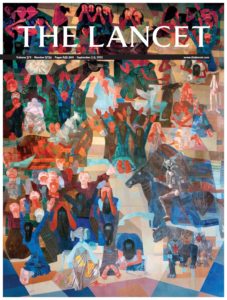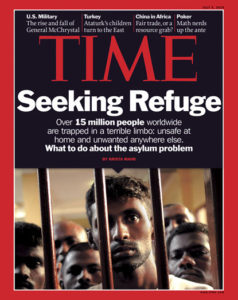Heavyweight publications go into bat for refugees
Two major international magazines have published strong editorials calling for a global action on the refugee crisis to mark World Humanitarian Day (WHD).
Time Magazine and the world’s foremost medical journal, The Lancet, have both carried crusading editorials highlighting the deficient global response to the global migration crisis.
The stances of the two publications is a salutary development given they are both influential, largely conservative organs whose constituent readerships have a vested interest in social the status quo.
 The Lancet, a 193-year-old UK-based medical journal said it was time to take stock of the needs of vulnerable populations living in challenging environments worldwide and international collaboration towards meeting those needs.
The Lancet, a 193-year-old UK-based medical journal said it was time to take stock of the needs of vulnerable populations living in challenging environments worldwide and international collaboration towards meeting those needs.
It said WHD was “an opportunity to reflect on the global response to one of the greatest health and humanitarian crises of our time, that of refugees and migrants”.
“In 2015, there were 244 million migrants and 65 million people who were forcibly displaced, including more than 21 million refugees, thee million asylum seekers and more than 40 million internally displaced persons,” The Lancet said.
“On September 19, 2016, at the UN General Assembly in New York, the first High-Level Summit on addressing large movements of refugees and migrants will be hosted by UN Secretary-General Ban Ki-moon, with the aim of securing a more coordinated and humane approach to the crises affecting this population,” it said.
The Lancet referenced a draft political declaration to be put to the summit had an abiding problem exacerbating the issue of refugee in that, like the 1951 Refugee Convention, it was not legally binding on nations.
“Definitive action has been deferred to 2018 when a Global Compact on refugees and a Global Compact for safe, orderly and regular migration will be agreed by UN member states,” The Lancet said.
It said such a delay on a comprehensive plan was “scandalous” considering the immediate and unmet needs of millions of refugees and migrants worldwide.
“Refugees and migrants represent one of the most vulnerable populations on the planet today. Not protected by citizenship, escaping conflict, violence, persecution, or poverty, they have the same aspirations of any human being – safety, good health, and opportunities for a better future,” The Lancet said.
“They are reliant on the international community to help them realise such an existence. Sadly, on current assessment, it is failing them,” it concluded.
Meanwhile, Time Magazine used some populist imagery to point out the failings of the global community on the refugee issue.
 “As history buffs and film fans know, there weren’t enough lifeboats for passengers aboard the Titanic,” Time said.
“As history buffs and film fans know, there weren’t enough lifeboats for passengers aboard the Titanic,” Time said.
“As the boats, some less than full, pulled away from the sinking ship, debate began among the lucky few about whether to return to pluck the drowning from the water. Some claimed it was a moral duty to try. Others warned that the drowning masses might capsize the boats,” it said.
“The migrant story we now know best is one that begins in Syria and ends in Europe, or somewhere along the way.
“After more than a million entered the EU last year, Balkan countries like Hungary built obstacles to keep them out and desperate European leaders cut a deal with Turkey to prevent asylum-seekers from entering Europe via Greece,” Time said.
“Immigration is also part of the story behind June’s Brexit referendum in the UK,” it said.
The magazine referred to a recent report by NGO Oxfam claiming the US, China, Japan, Germany, France and the UK – countries that represent well over half the global economy – now host just 2.1 million refugees, or less than 9 per cent of the world’s total.
“For the world’s refugees, there are more than enough lifeboats, but the fears they provoke have grown beyond reason in developed countries,” Time said.
“The rights of refugees are defined under both international agreements and national laws. But there is also a moral responsibility to help those who need it, whenever and wherever possible.
“The world’s wealthiest nations are failing in that responsibility,” the magazine said.
Laurie Nowell
AMES Australia Senior Journalist












